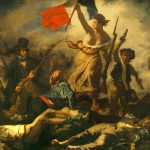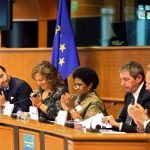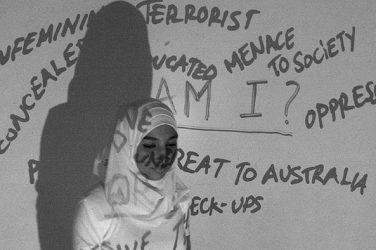Every other, or fourth year, depending on what kind of sports you find interesting, the Olympic Games take place somewhere in the world. After years of being a candidate city and spending millions, if not billions of euros, dollars or yen on promotion, new arenas and an entire little city for the athletes to live in during the Olympics, a veritable circus rolls in. For the next three weeks, the host city is the focus of most major sports broadcasts around the globe.
This year, the Summer Olympics circus came to Rio de Janeiro and Brazil. Following many a scandal, corruption, and worsening (and crippling) inequality, athleticism was widely celebrated and many media outlets tallied the medals each country won in medal tables. In most tables, the United States ended up on top with a grand total of 121 medals, of which 46 were of the gold variety.
But not in all tables. The German communications firm Euro-Informationen created their own table, with the European Union topping the list, having more than double the medals of the US, in all categories. The firm does, however, admit that the table is not completely fair as “the 28 EU countries have much higher quota of starting positions than individual competing nations. The fictitious “EU team” has therefore a better chance to win medals than the other participating countries.” Nonetheless, and it was probably the point, the table does raise an interesting question – should the EU compete as a single team at the Olympics?
After the 2008 Summer Olympics in Beijing, the European Parliament did rise to answer this question, where they interviewed several MEPs about this prospect. A Greek MEP said it would be “magnificent” and that it “”would add many messages of unity to our Union.” Some other MEPs were a bit more skeptical, worried that many countries would not be able to send any representatives to the Olympics, such as a Romanian one who argued that “if the EU had had one single team, many Member States would not have been able to send representatives…I believe in a Europe of diversity and competition.” And that “representation in the Olympics is by separate nations and that’s how it should stay.”

Unified teams in the history of the Olympics
Unified teams at the Olympics is not a novel idea. During the Olympics in the 1950s and 1960s, West and East Germany competed under the same Olympic flag as the “United team of Germany”. During its existence, the Soviet Union competed under the same flag while being a federation of semi-independent states. And after the fall of the Soviet Union, many of the new republics competed under the same flag in the 1992 Olympics: the team was dubbed the “Unified team”.
The Olympics has actually for a long time been a symbol for unity and peace, stretching back to the original Olympics of Ancient Greece. Fighting states would lay down their arms and pledge to not attack the host city of the Olympic Games, and that all athletes and spectators would enjoy safe travel to the event. This was revived in the 1990s when the International Olympic Committee, IOC, asked all its members to observe the Olympic Truce, and this was even put into a UN Resolution.
This has led to some impressive feats of unity. In 1994, Yugoslavian athletes competed under the same flag, despite the horrific civil war tearing the country apart. In 2000, South and North Korea marched together in the opening ceremony under the Korean Unification Flag. In a similar fashion, during the recent 2016 Olympics, there was one team that got a standing ovation at the Opening Ceremony – the Refugee Olympic Team, consisting of refugees from war torn countries such as South Sudan, Ethiopia and Syria.

Rose Nathike Lokonyen, Paulo Amotun Lokoro and Yusra Mardini, of the Refugee Olympic Team
A European identity vs. the Olympic spirit
All of this goes to show that the concept of states, countries or nations is a very fluid one, and that the Olympic Games are no different, in a world where new countries are created and some are even lost in the greater span of time. Calls for independence can be heard all around the world, including in many European nations, such as the independence referendum in Scotland, or the Basque region. But calls for a stronger European Union can also be heard. It is within this context that Euro-Informationen and their medal table play: the debate over a common European identity.
As history has proven, European identity and integration on a cultural level is trickier than just negotiating a trade deal. And sports is indeed very cultural.
As history has proven, European identity and integration on a cultural level is trickier than just negotiating a trade deal. And sports is indeed very cultural: “We can be proud of the performance of the bigger European states, which have done their strength, history and traditions justice. I do not think that there will be a unified European team representing the EU in the near future, as each country is proud of its identity and maintains serious sporting traditions,” says one Hungarian MEP.
However, two slightly different truces ideas of the world come face to face. One is the European project, which famously received a Nobel Peace Prize for its contribution to peace and reconciliation in Europe during its work for an ever closer union of the European Community. Much of the project is built around the idea of the lessening importance of the nation state, and state-based norms and values with it. This is especially true for projects and agencies promoting Europeanism and closer European integration.
On the other hand, there are the Olympic Games. The Games in general, and the Olympic Truce in particular, however, does seemingly not try to move away from these values. In a way, it even celebrates the nation-state and the differences between all Olympic participants: the Olympics as a celebration of athleticism and culture despite differences or even wars. One of many of these inspiring moments was when a South Korean athlete took a selfie with a North Korean athlete at this year’s Olympic Games, amid much criticism from the latter’s home country.
olympic truce.

The Olympic identity transcends boundaries
The Olympic Games will stay no matter what happens with nation-states or countries. At the inception of the modern Olympics, the Russian Empire competed, only to be followed by the Soviet Union. These days, Russia and numerous free republics once part of the Soviet Union compete as independent nations, as do countless former colonies from all around the world. As yet another MEP, Katerina Batzeli of Greece, said: “The main value of the Olympic Games has always been and should remain fair competition and the spirit of the Olympic truce. Irrespective of whether European athletes compete in national teams or a single EU one”. Maybe it is here where the heart of the matter lies: The Olympic identity, it would seem, transcends boundaries, global politics and trade negotiations.
The circus will keep coming to town, and with it the world of its day.
And as the 2016 Rio Olympics has proven, the circus will keep coming to town, and with it, the world of its day. During the 1994 Olympics this meant having Yugoslav athletes competing together under the same flag. In 2016 this means refugees being able to compete for their home nations, despite being forced to leave it due to war or starvation. While wars, nations, and even Unions come and go, the Olympics will remain, as will its call for global peace and unity.










